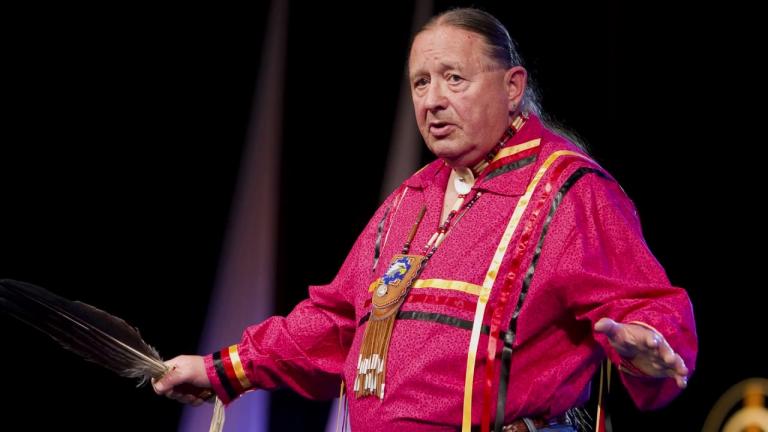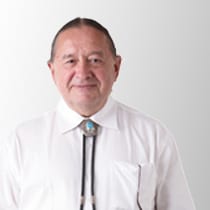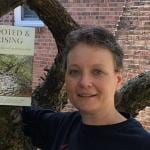Tink Tinker is a citizen of the Osage Nation and an elder in the urban American Indian community of Denver, Colorado. He is the Clifford Baldridge Emeritus Professor of American Indian Cultures and Religious Traditions at Iliff School of Theology, where he taught for thirty-four years. Dr. Tinker agreed to be interviewed for the book Rooted and Rising: Voices of Courage in a Time of Climate Crisis which I co-edited with my colleague, Margaret Bullitt-Jonas.
Tinker’s words hold white christians to account for the atrocities that have been done – and continue to be perpetrated – against Indigenous peoples, their nations, and the land. And they are a stark reminder that we cannot appropriate hope or despair from those we have brutally colonized and continue to oppress.
[Note that in keeping with Dr. Tinker’s request, the use of the lower case for such adjectives as “english,” “christian,” “european,” etc., is intentional. It allows readers to avoid unnecessary normativizing or universalizing of the principal institutional religious quotient of the christian euro-west.]

Wisdom and hope
Leah: Tink, you’ve written about the bitter irony of whites turning to American Indians to ask for wisdom to help rescue white people from the environmental jeopardy that they themselves caused. This has included centuries of slaughtering and oppressing First Nation peoples. Now that the climate crisis has become even more acute, can you share your sources of hope?
Tink: I am not a person who embodies hope. I am much more in league with my colleague Miguel de la Torre who fashions himself as a theologian of NO-HOPE. After 500 years of violence, invasion, genocide – all of which is on-going – hope is not a viable category for me.
Christians have a history of trying to make us like white people through the ongoing indoctrination of the “protestant work ethic,” capitalism, and assimilation to euro-centric culture. Indians would have to further compromise our cultural values to assent to a theology of hope. And besides, what Indians are experiencing today is a continuing, non-stop violation of what is left of our lands by euro-christian corporations – for instance, building pipelines against the wishes of local Native communities across their lands, and mining sacred sites.
Facing the crisis
Leah: What I hear you saying is that when the dominant group strips the oppressed group of its hope, it cannot turn around and look to that group to rescue them when they are facing an existential crisis of their own making. Can you share examples of ways in which hope has been stripped from your people?
Tink: Whites tell stories that Indians welcomed them onto their land. In fact, we were coerced and forced into giving up our land in order to save our people. We had no choice but to move our people to the reservations. Even then, the christians never kept their word. Thousands upon thousands were massacred throughout the land. As the leader Red Cloud once said, “The white people have made my people many, many promises. They only kept one. They promised that they would take our land.”
The Osage Nation signed something like seven treaties in forty-nine years for the promise of health, education, and welfare, all of which have been violated by the U.S. government. Now this same government is in the process of trying to erase all Indians by saying we’ve got to stop the welfare state. But it’s in the treaty!
It’s rent payment! It’s not welfare.
Never forget that your wealth, the home that you live in (whether you own it or rent it), the salary you earn, comes from the theft of Indian land, the extraction of resources from that Indian land, and the oppression of forced labor on African peoples who were kidnapped and brought here to work this land. And then Asian peoples who were brought in to compete with African people after the Civil War in order to keep labor prices low. All of this so that your christian people might have and keep all the more.
When you’re on the receiving end of that land and wealth, you might see it as “God’s great gift.” But in reality, it is a tragedy. When you’re on the receiving end of that oppression from the christians, their God is an abject oppressor and not at all a savior.
Broken promises, violated treaties
Leah: Do you see any chance for elected leaders to right the wrongs that have been perpetrated against your people?
Tink: Just the opposite. For instance, what would any politician do about the Treaty of Ruby Valley and the intentions of Newmont Mining Corporation with regard to gold mining on Western Shoshone lands? The cyanide they use to begin the refining on-site has poisoned the land and people.
Then there is the uranium mining on Native lands in New Mexico and Arizona. And the Rio Tinto Zinc Corporation’s copper mine in central Arizona that will hollow out a whole sacred Apache mountain before caving it in as refuse. Even the telescope they built on top of Mt. Graham required scraping the top of the mountain flat – over the objections of the San Carlos Apache. All the sacred energy of that mountain has now gone into retreat and is lost to the people.
500-year organized crime spree
Indeed, Barbara Mann calls the last five centuries of christian colonialism “a 500-year organized crime spree.” Unfortunately, it’s still going on. No potential american government has or will have the energy or the spirit to oppose this military-industrial phalanx. We Natives are projected to continue to lose our lands and our lives – unless we move to the cities and become like white people, leaving our cultures and love of the land behind us.

Leah: Does that mean you have given up?
Tink: No. I continue to resist, though more sedately since turning 70. But still without hope.
Neither hope nor despair do they owe
Leah: So my asking you for a word of hope is yet another example of whites wanting to appropriate the Native American perspective to extract some kind of wisdom for our white christian project. Your words are meant to call us to accountability and justice. But another of my colleagues has pointed out that we don’t get to appropriate your despair, either.
Tink: That’s also true. What I’ve told Indian people all along is that we’ve got to remember the tragedy of colonialism. And part of what’s happened to us is that our own minds have been colonized. Our task now is to decolonize our own minds. To break loose from the shackles with which the missionary has burdened us.
Even our languages have been practically erased. We need to get rid of the colonizer’s language and recover the deep meaning of our own languages. So many Indian reservations have language recovery and language preservation programs. We need to teach this to our children . . .
To read more of Leah’s interview with Tink Tinker, along with the other 20 chapters from environmental activists across the religious spectrum, order your copy of Rooted and Rising: Voices of Courage in a Time of Climate Crisis. For a limited time, you can use the code RLFANDF30 to receive a 30% discount when ordering at this link: https://rowman.com/ISBN/9781538127759/Rooted-and-Rising-Voices-of-Courage-in-a-Time-of-Climate-Crisis

Leah D. Schade is the Assistant Professor of Preaching and Worship at Lexington Theological Seminary in Kentucky. She is the author of Preaching in the Purple Zone: Ministry in the Red-Blue Divide (Rowman & Littlefield, 2019), Rooted and Rising: Voices of Courage in a Time of Climate Crisis (Rowman & Littlefield, 2019), and Creation-Crisis Preaching: Ecology, Theology, and the Pulpit (Chalice Press, 2015).
Twitter: @LeahSchade
Facebook: https://www.facebook.com/LeahDSchade/
Read also:
NEW BOOK: Rooted and Rising: Voices of Courage in a Time of Climate Crisis
Rooted and Rising in Advent: 28 Days for Connecting with Earth













